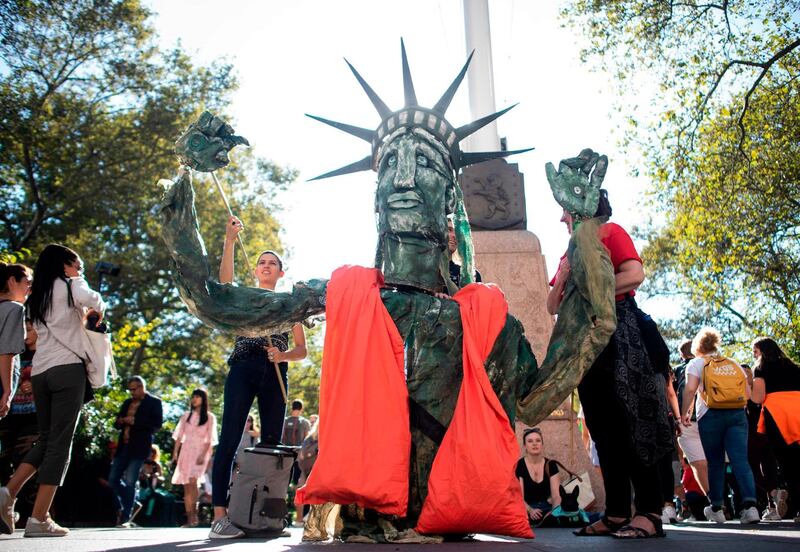When Janet Mills ran for the Maine governorship last year, the Democratic candidate made clean energy a key plank of her successful election campaign.
Assuming control of the state in the north-east corner of the US in January, she set a target of producing 80 per cent of its energy from renewable sources by 2030.
It also wants to cut greenhouse gas emissions to 45 per cent of 1990 levels by 2030 and 80 per cent by 2050.
She also wants 80 per cent of Maine's electricity to come from renewable sources by 2030 and 100 per cent by 2050.
Standing in a field of solar panels in June, Governor Mills signed three pieces of legislation intended to turn her ambitions into reality.
She said the state was "ushering in a new era of clean energy and climate leadership".
The measures included requiring the state's Public Utilities Commission to offer long-term contracts for clean energy generation.
She also restored a system known as "net metering" which means homes with solar panels receive a credit on their bills for electricity they produce but do not use.
Even though environmental legislation had bipartisan support, Ms Mills' predecessor, the Republican Paul LePage – a strong supporter of Donald Trump – had blocked a raft of bills.
Mr LePage's stance echoed that of the president, who has pursued a policy of sweeping deregulation of the fossil fuel industry and is downright hostile to renewable energy.
But states are fighting back.
Democrat-controlled California leads the way with solar energy, accounting for 41.5 per cent of the US total – not surprising, given the amount of sunshine the state gets. Solar energy also provides 18.3 per cent of the state's total energy consumption.
The 2018 mid-term elections were good news for the solar and renewable advocates, with Ms Mills among seven Democrats who unseated their Republican rivals in gubernatorial races.
"Despite the efforts by the Trump administration to favour fossil fuels, the transition to renewables has continued, led by aggressive 100 per cent renewable goals that Maine, California, New York, Washington, Nevada, New Mexico, Wisconsin, Minnesota and several other states have adopted, with other states preparing to follow suit," says Gary Cook of Greenpeace.
"Much of the current leadership has been enabled in part by similar long-term commitments to 100 per cent renewable energy made by major corporations, including fast-growing IT companies like Facebook, Google, and Apple."
Having run on a platform of putting coal miners back to work, the President Trump's most eye-catching move on taking office was to pull out of the Paris Climate Accord.
Arguing that the previous administration's climate change policies both forced up electricity prices and acted as a roadblock to energy independence, Mr Trump has lifted restrictions on coal, oil, shale and natural-gas production.
At the same time, his administration has attacked the renewable energy industry.
Plans for the country's largest wind farm, to be built off the coast of Massachusetts, have been delayed so that it can undergo a "more robust analysis".
The trade war with China has resulted in the administration slapping massive tariffs on solar panels, currently at 25 per cent, which has slowed the annual growth of solar installations by around 2 per cent.
It is feared more damage will be done by planned reductions in the Solar Investment Tax Credit, an initiative which has seen the industry grow more than 10,000 per cent since being introduced in 2006.
It is increasingly falling to states to plug the gap left by the withdrawal of these subsidies.
As the presidential election approaches, energy policy will be one of the major areas of political conflict.
"I think the Trump administration has been fixed on traditional energy," says Rachel Pierson, managing director of Beacon Policy Advisers, a Washington-based political consultancy.
"The Republicans view this as where jobs have traditionally been and their concern is about maintaining jobs in the coal and natural gas industries in states where their political base is, such as West Virginia and Wyoming.
"They don't see climate change as a pressing issue. They regard the current economy as far more important."
Renewable energy such as solar power not only threatens traditional jobs, but some of Mr Trump's wealthiest benefactors.
"The donor base fears losing out if some of these things are allowed to go through."
For the Democrats, Ms Pierson adds, climate change is a pressing issue – although presidential candidates differ on how far they are prepared to go.
Many things could be done by executive order, but getting more radical measures through a Republican-controlled Senate may prove more challenging, she says.
Should the Democrats win the White House next year, the incoming president will face a huge battle overhauling the market-driven US health system and steering legislation through Congress that will guarantee care for everyone. That could drain much of the energy of any Democrat administration.
"The issue, after health care, is how much political capital will they have left for climate change."







